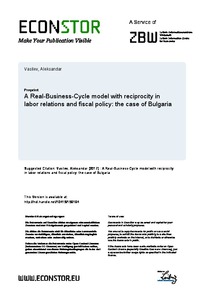A real-business-cycle model with reciprocity in labor relations and fiscal policy: the case of Bulgaria

ZBW - Leibniz
2017
26 p.
fiscal policy ; labour relations ; unemployment ; wage policy
Wages and wage payment systems
English
Bibliogr.
"In this paper we introduce reciprocity in labor relations and government sector to investigate how well the real wage rigidity that results out of that arrangement ex- plains business cycle fluctuations in Bulgaria. The reciprocity mechanism described in this paper follows Danthine and Kurmann (2010) and is generally consistent with micro-studies, e.g. Lozev et all. (2011) and Paskaleva (2016), while at the same time comes into contrast with models with efficiency wages of no-shirking type that empha- size the importance of aggregate labor market conditions as the main determinant in wage setting, e.g. Vasilev (2017). Rent-sharing considerations, and worker's own past wages turn out to be the most important aspects of how labor contracting happens. In contrast, aggregate economic conditions, as captured by the employment rate, are not found to be quantitatively important for wage dynamics. Overall, the model with reciprocity and fiscal policy performs well vis-a-vis data, especially along the labor market dimension, and in addition dominates the market-clearing labor market frame- work featured in the standard RBC model, e.g Vasilev (2009)."
Digital
The ETUI is co-funded by the European Union. Views and opinions expressed are however those of the author(s) only and do not necessarily reflect those of the European Union or the ETUI.